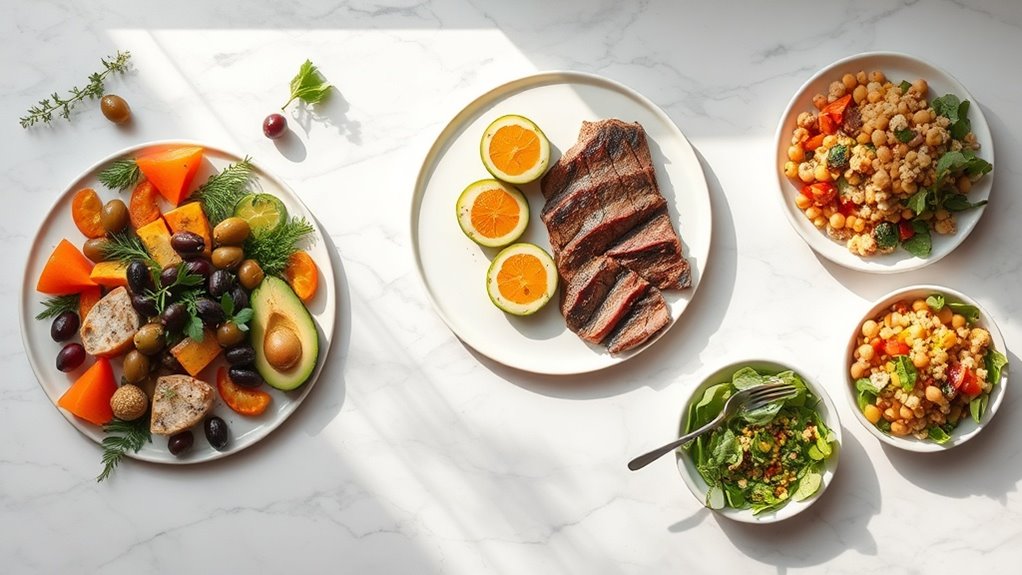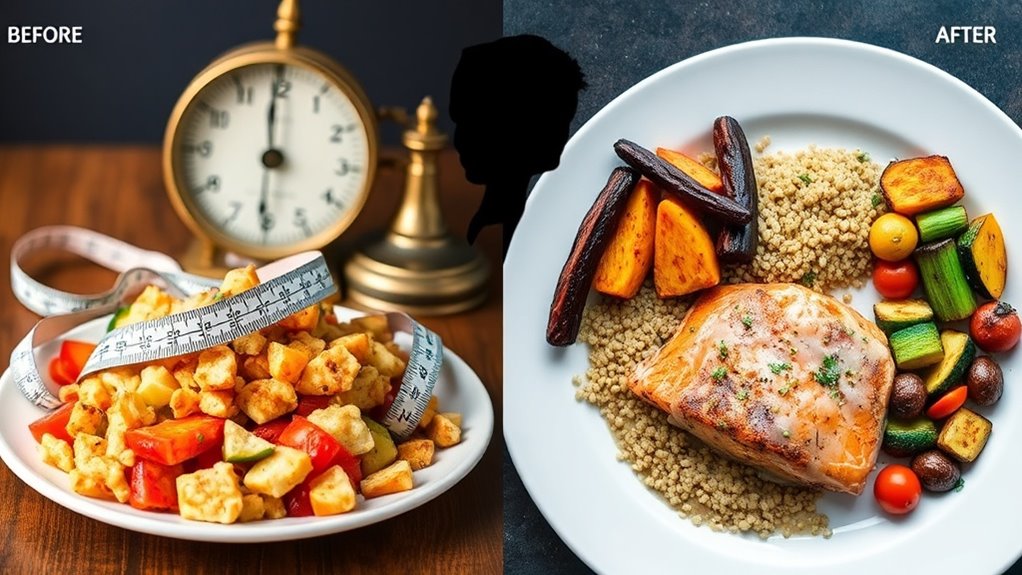10 Things I Wish I Knew Before Starting a Diet
Understanding Your Why
Understanding your “why” is the foundation of any successful diet journey.
When you clarify your motivation, you lay the groundwork for lasting change. Reflect on personal goals like health improvements or self-esteem boosts.
These diet lessons can guide your choices and keep you committed. Remember, a strong “why” fuels your determination, making it easier to overcome obstacles along the way. Additionally, fostering healthier relationships with food can further support your motivation and make your weight loss journey more enjoyable.
Setting Realistic Goals
Setting realistic goals is crucial for your diet journey, as aiming too high can lead to frustration and disappointment. Focus on achievable milestones, like losing one to two pounds per week. This approach not only promotes sustainable progress but also boosts your motivation. Incorporating mindful eating practices into your routine can further enhance your ability to meet these realistic goals.
The Importance of Meal Prep
Achieving realistic goals in your diet is just the beginning; meal prep can elevate your success even further. By preparing your meals in advance, you’ll save time, reduce stress, and resist temptations.
Remember:
- You’ll stay on track with portion control.
- You can enjoy variety in your meals.
- You’ll minimize last-minute unhealthy choices.
- You’ll save money.
- You’ll feel accomplished and motivated.
- Meal prep also encourages experimenting with new recipes, making your diet more enjoyable and sustainable.
Meal prep is your ally!
Balancing Nutrients, Not Just Calories
While counting calories might seem like the only strategy for losing weight, focusing on nutrient balance is crucial for your overall health and long-term success.
Prioritize foods rich in vitamins, minerals, and healthy fats. Incorporating lean proteins, whole grains, and plenty of fruits and vegetables keeps you satisfied and energized. This holistic approach supports weight loss while promoting better overall well-being, enhancing your diet’s effectiveness. Additionally, whole grains not only improve digestion but also help regulate blood sugar levels, contributing to sustained energy throughout the day.
Finding Support and Accountability
Having a strong support system can significantly impact your dieting journey. Surrounding yourself with encouraging friends or joining groups can keep you motivated and accountable.
You’ll find success easier and more enjoyable when you share your goals. Consider these options:
- Friends who cheer for you
- A workout buddy
- Online forums for encouragement
- Meal prep partners
- Professional nutritionists for guidance
Additionally, tracking your food intake through a food journal can enhance your accountability and help identify eating patterns.
The Role of Mindfulness in Eating
Mindfulness plays a crucial role in transforming your relationship with food, as it encourages you to pay attention to your eating habits and emotional triggers.
By practicing mindfulness, you’ll savor each bite, notice hunger cues, and reduce emotional eating.
Research shows that being present during meals can enhance satiety and satisfaction, helping you make healthier choices and ultimately support your weight loss goals.
Learning to Read Nutrition Labels
Understanding your eating habits through mindfulness can lead to a greater awareness of what you consume, making it easier to navigate nutrition labels effectively.
Here are some key aspects to focus on:
-
Serving Size: Know what you’re really eating.
-
Calories: Keep track of your intake.
-
Ingredients: Avoid hidden sugars and unhealthy fats.
-
Nutrients: Prioritize fiber, protein, and essential vitamins.
-
Daily Values: Understand how foods fit into your daily needs.
The Impact of Stress on Dieting
Stress can significantly affect your diet by triggering the release of hormones that increase appetite, making it harder to stick to your goals.
You might find yourself reaching for comfort foods in response to emotional stress, which can derail your progress.
Understanding these connections can help you develop healthier coping strategies and maintain your commitment to a balanced diet.
Stress Hormones and Appetite
When life throws challenges your way, it’s easy to overlook how those stressful moments can sabotage your dieting efforts.
Stress hormones like cortisol can increase your appetite, making it harder to stick to your goals.
Remember how stress can lead to:
- Cravings for unhealthy foods
- Heightened emotional responses
- Lack of motivation
- Disrupted sleep patterns
- Impulsive eating decisions
Stay aware and manage stress for better results.
Emotional Eating Triggers
While juggling life’s demands, it’s all too easy to let emotional eating derail your dieting efforts.
Stress can trigger cravings for high-calorie comfort foods, leading to overeating. Recognizing these emotional eating triggers is crucial.
When stress hits, pause and reflect on your feelings instead of reaching for snacks. Consider healthier coping strategies, like exercise or mindfulness, to manage stress without sacrificing your goals.
Avoiding the “All or Nothing” Mentality
To succeed in your diet, it’s crucial to embrace small changes rather than striving for perfection.
Celebrate your progress, even if it feels imperfect; these moments contribute significantly to your overall journey.
Embrace Small Changes
Embracing small changes can be a game-changer in your weight loss journey, steering you away from the debilitating “all or nothing” mentality.
Rather than aiming for perfection, focus on achievable steps:
- Enjoy that piece of fruit instead of a sugary snack.
- Walk for just 10 minutes daily.
- Drink more water.
- Choose whole grains.
- Get adequate sleep.
These shifts cultivate sustainable habits, leading to lasting results.
Celebrate Imperfect Progress
Focusing on small changes is a powerful strategy, but many people still fall into the trap of the “all or nothing” mentality.
Recognize that progress isn’t always linear. Celebrate each step, even if it’s not perfect, because every effort counts.
Research shows that acknowledging small victories boosts motivation and fosters long-term success, helping you stay engaged without feeling discouraged by setbacks.
Embracing the Journey, Not Just the Results
When you embark on a diet, it’s easy to fixate on the end goal, but appreciating the journey can make all the difference.
Focus on the small victories, learn from setbacks, and build healthier habits.
- You’ll discover new favorite foods
- Celebrate your strength and resilience
- Experience personal growth
- Cultivate mindfulness
- Foster deeper connections with others
Embrace each moment!





